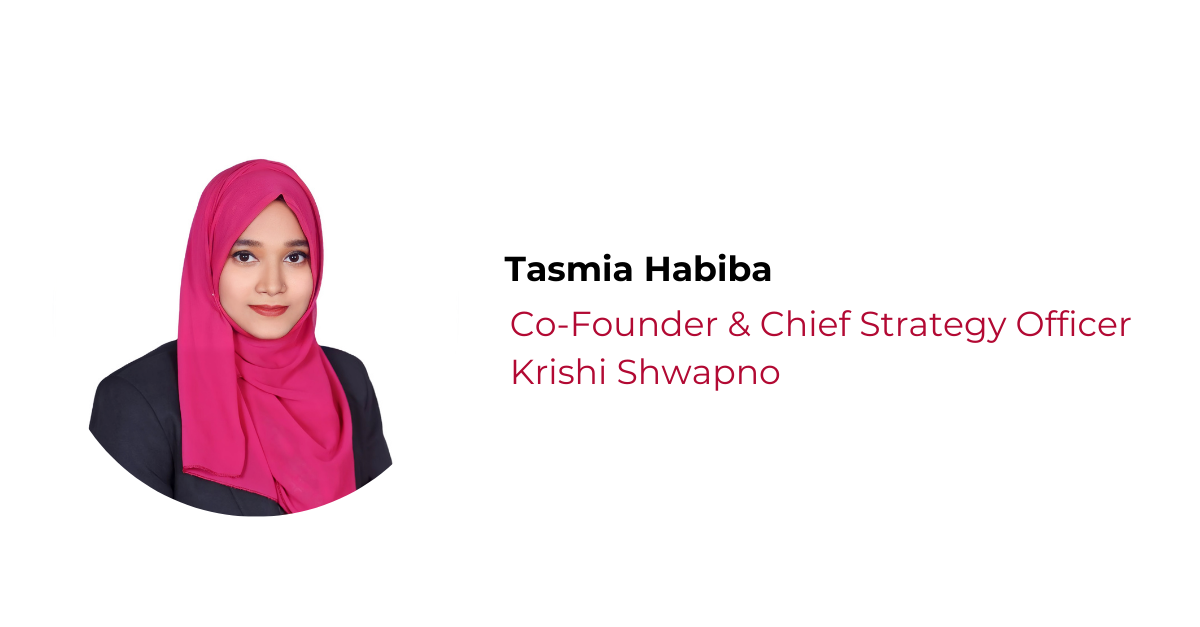To mark International Women's Day 2024, we have interviewed a few women entrepreneurs associated with the Scaling Up Nutrition Business Network (SBN). This interview aims to shine a spotlight on the invaluable contributions of women in the workplace and what inspires them.

Please introduce yourself, share insights about your business, and delve into the inspiration behind steering such a venture.
My name is Tasmia Habiba, and I lead Krishi Shwapno as its Co-Founder and Chief Strategy Officer. Krishi Shwapno, Bangladesh’s first technology & circular economy-based data-driven integrated agri supply chain and agri commodity trading platform, which ensures fair prices for farmers and safe food for consumers through food traceability reducing the post-harvest losses.
Growing up in the village, I had a unique opportunity to witness the plight of the farmers as well as the massive potential in the agriculture industry in Bangladesh. As I grew up over the years, my interest in the agricultural industry continued to grow albeit with a sad realisation at heart: most young professionals of my generation do not see the potential that agriculture has in Bangladesh, and they are reluctant to consider prospects in this industry as a career option.
However, my outlook was different which is why I went ahead to study in one of the most prominent agricultural universities in Bangladesh – Sher-e-Bangla Agricultural University. My vision is to promote large-scale sustainable agribusiness, encouraging greater involvement of youth and women in agriculture, to elevate the global perception of our agriculture sector. These epiphanies inspired me to start Krishi Shwapno in 2019. I pursued my graduation in agricultural science to address the issues faced by the farming community and was determined to use my academic knowledge as well as passion to create a difference.
How did you become a member of the Scaling Up Nutrition Business Network (SBN)?
I have joined the Scaling Up Nutrition Business Network (SBN) as a member, following my participation in its highly impactful startup competition, the "Food Frontiers Innovation Challenge" 2.0 program. Food Frontier serves as a platform for entrepreneurs and enterprises dedicated to creating meaningful impact in the nutrition sector.
This was an exceptional learning experience as I attended multiple training sessions including the Bootcamp that gathered some of the most talented startup trainers and instructors in the country. SBN served as a catalyst in my career that opened many doors of opportunities for me later.
What are the challenges you face as a female-led SME in your country?
As a female-led SME in Bangladesh, we face several unique challenges that stem from societal norms and systemic barriers. These challenges include limited access to finance and investment opportunities due to gender biases in the financial sector, as well as cultural expectations that may hinder women's participation in business leadership roles.
Additionally, there are challenges related to balancing work and family responsibilities, as well as accessing networks and mentorship opportunities that are often dominated by men.
How has SBN supported in finding solutions to some of these challenges? (training, technical assistance, business support services, etc.)
Thanks to SBN, I've received valuable training and business support tailored to the needs of female entrepreneurs like me. These resources equipped me with skills and confidence to address challenges, from improving finances to breaking gender barriers. SBN also provided a supportive community of entrepreneurs and mentors who understand the unique challenges faced by women in business. This network has been a source of inspiration, enabling me to thrive and grow my business despite the odds.
What kind of content was given in the training? What stood out most for you/the biggest lesson from that training? How has the training changed the way you do business? (For Bangladesh)
The training sessions covered a diverse range of topics, including business strategy, marketing, financial management, and nutrition-specific knowledge.
One aspect that stood out to me the most was the emphasis on incorporating nutrition considerations into business practices. This holistic approach not only enhances the impact of our products and services but also aligns with the broader goal of improving nutrition outcomes in Bangladesh.
Through SBN, I connected with entrepreneurs and experts in nutrition, fostering collective efforts. The training changed my business approach, prioritising nutrition decisions, seeking collaborations, and adapting to market needs. With SBN's help, I'm more confident as a female entrepreneur in Bangladesh, ready to drive positive change through my ventures.
Women entrepreneurs should emphasise their business narrative, engage in mentorship, collaborate with similar organizations, and showcase women's unique strengths.
Considering the theme for this year’s International Women's Day, inspire inclusion, how is your country's network supporting inclusion?
In the spirit of this year's International Women's Day theme, "Inspire Inclusion," the SBN in Bangladesh is actively supporting inclusion by providing a platform for female entrepreneurs to voice their concerns, share experiences, and collaborate on innovative solutions. The network serves as a catalyst for breaking down barriers, encouraging equal opportunities, and promoting a more inclusive business ecosystem.
SBN in Bangladesh stands out by engaging the private sector to promote nutrition-sensitive business practices, unlike traditional aid. By integrating nutrition into operations, it boosts women's access to
nutritious food and economic opportunities. Partnering with private sector entities, SBN empowers women economically and improves nutrition outcomes sustainably, fostering long-term benefits for women's inclusion and community health.
Most importantly through this SBN journey starting in 2022, my initiative, Krishi Shwapno, has become one of the winners of the prestigious Global Innovation Challenge (GIC) and Bangabandhu Innovation Grant (BIG) in 2023.
What is your advice to women-led SMEs striving to gain recognition and inclusion?
For women-led SMEs in Bangladesh, my advice is to utilize networks like the Sun Business Network (SBN) for personalized support.
Women entrepreneurs should emphasise their business narrative, engage in mentorship, collaborate with similar organizations, and showcase women's unique strengths. By advocating for their business and supporting gender equality initiatives, they can gain recognition and pave the way for success in the business landscape.